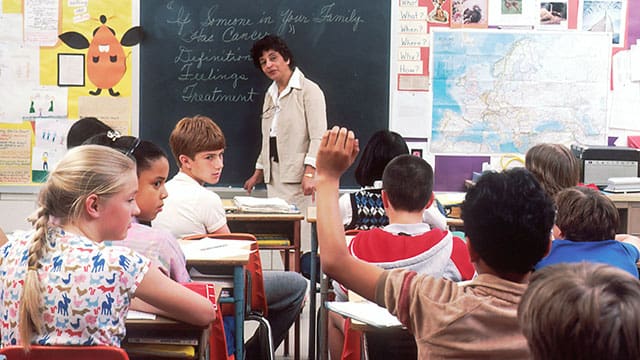Canadian teachers strive to create inclusive classrooms where every student feels valued and supported
 Canada is one of the most diverse countries in the world, and this diversity is one of our greatest strengths. Our exceptional education system is perhaps the greatest tool we have to nurture the unique talents of each resident.
Canada is one of the most diverse countries in the world, and this diversity is one of our greatest strengths. Our exceptional education system is perhaps the greatest tool we have to nurture the unique talents of each resident.
But how do ordinary teachers put this ideal into practice?
One of the most important things that teachers learn is that when students walk into their classrooms, each of those children becomes the most important person in the world. The teacher becomes a significant person in that individual’s life. Our students come from highly diverse racial backgrounds, from gifted readers to people who hate books, from traditional households to no households. Each of them is sacred, and each of them needs to be celebrated.
 Photo by National Cancer Institute |
| Related Stories |
| True diversity requires a healthy dose of humility
|
| Time to un-cancel diversity of opinion
|
| The importance of a diversity of opinion
|
Given this reality, I recently began a discussion with a friend who also teaches high school Social Studies. We talked about how we apply the principles we believe in. We explored different methods and strategies to celebrate each student’s unique background and strengths, ensuring every student feels valued and supported in our classrooms. Our conversation helped us reflect on our teaching practices and find new ways to better serve our diverse student populations.
Annie is an Arab-Jewish teacher in Surrey, BC. I am a Christian-Arab teacher in Prince George. I am also half-German. Annie’s family fled antisemitism in Europe hundreds of years ago and found refuge in the Arab world – as many Jews did – settling in Morocco. My German ancestors bought into that lie of antisemitism, and I have to admit that my enthusiasm for teaching equity comes from a desire to change the course of history so that we never have another Holocaust.
We need to remember that education can be either a tool of racist propaganda or a means to build a society by embracing diversity. One leads to death and destruction; the other leads to peace and prosperity.
It’s interesting to see how, despite our vast differences in ethnicity, religion, gender, generation, and geography, Annie and I have adopted a similar philosophical approach to teaching Social Studies. We believe our students need to understand what discrimination looks like and the consequences it leads to. Moreover, they need the opportunity to apply this understanding to the world they observe around them. This shared perspective shapes our teaching, helping students grasp the importance of empathy and social justice.
One of the lingering horrors of the Holocaust is that we have not made “never again” a reality. To achieve this goal, we need to analyze the banal reality of evil. Genocide is not a single act; it is a process. In the mind of a genocidaire, people are not seen as individuals but as vermin, rats, cockroaches, terrorists, and foreigners to be cleansed. Genocide never happens without dehumanization. Therefore, the remedy is to humanize and celebrate every diverse human being.
Annie and I have observed that students often relate their learning about genocide to their own experiences. This process can challenge teachers to overcome their own biases, which are sometimes rooted in personal trauma. But by letting students research topics that are meaningful to them and present their findings to classmates, we see amazing results. The concepts become tangible, fostering a deeper understanding and bringing us a step closer to the goal of “never again.”
It is fascinating to see how our students embrace this empathy. Annie, for example, has visited the West Bank and teaches about the horrors currently happening in Gaza. She also has relatives in Israel, and her Arab students frequently express concern for the well-being of her family members. This level of empathy and understanding among students from diverse backgrounds highlights the powerful impact of teaching about global issues and humanizing each individual’s experience.
There is nothing unique about what Annie and I are doing. Canadian schools make it possible for every student to excel because teachers do their best to create the atmosphere envisioned by the African American writer Robert Jones, Jr. (also known as Son of Baldwin), “We can disagree and still love each other unless your disagreement is rooted in my oppression and denial of my humanity and right to exist.”
Gerry Chidiac specializes in languages and genocide studies and works with at-risk students. He received an award from the Vancouver Holocaust Education Centre for excellence in teaching about the Holocaust.
For interview requests, click here.
The opinions expressed by our columnists and contributors are theirs alone and do not inherently or expressly reflect the views of our publication.
© Troy Media
Troy Media is an editorial content provider to media outlets and its own hosted community news outlets across Canada.



The world needs more teachers like Annie and Gerry.